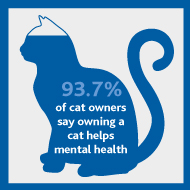
Findings released ahead of World Mental Health Day 2019
Research by leading feline welfare charity Cats Protection has highlighted the importance of pets to their owner’s mental health and wellbeing.
Survey findings published by the charity shows that nine out of ten cat owners (93.7 per cent) say owning a cat has a positive effect on their mental health. Of the activities that people said helped them most were stroking their cat (72 per cent) and playing with their cat (58 per cent).
When asked if owning a cat has had a positive effect on their mental wellbeing, 26.1 per cent of respondents said ‘very much’, 21.6 per cent said ‘quite a lot’, 23.5 per cent said a ‘fair amount’.
The research comes ahead of World Mental Health Day (10 October) and was conducted as part of Cats Protection’s ‘More Than Just a Cat’ campaign - an initiative that focuses on the numerous ways cats can enhance and enrich human lives.
Kate Bunting from Cats Protection said: “We often hear about how cats have had a positive impact on their owners’ wellbeing and it’s heart-warming to see how cats really can make such a difference to people’s lives.
“We believe anyone can benefit from owning a cat. From sharing a secret to being by our side during lonely times, cats lift our spirits and make us more able to cope with the stresses of modern living so having a cat in the home is a win-win for everyone.”
Eve Hawker from Romford, Essex, is one feline owner who credits her cat for helping her to improve her mental health. Following a complete mental breakdown earlier this year, Eve adopted a fluffy black and white cat called Dusty and says that he came to her at just the right time.
“I’m so grateful to Cats Protection for bringing Dusty and I together,” said Eve. “He has saved me and given me a purpose as well as more love and affection than I ever expected.
“He’s always with me and will help when I’m not feeling myself by nudging my hand and being even more affectionate than usual.
“Since having him in my life, my confidence has started to come back and I’m in a much better place and I believe he has played a huge part in improving my mental health. Dusty is so much more than just a cat, he’s my little angel.”



 The latest
The latest